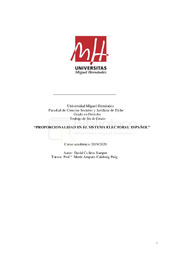Por favor, use este identificador para citar o enlazar este ítem:
https://hdl.handle.net/11000/25768Registro completo de metadatos
| Campo DC | Valor | Lengua/Idioma |
|---|---|---|
| dc.contributor.advisor | Calabuig Puig, María Amparo | - |
| dc.contributor.author | Cullera Samper, David | - |
| dc.contributor.other | Departamentos de la UMH::Ciencia Jurídica | es_ES |
| dc.date.accessioned | 2022-01-27T09:03:17Z | - |
| dc.date.available | 2022-01-27T09:03:17Z | - |
| dc.date.created | 2020-09 | - |
| dc.identifier.uri | http://hdl.handle.net/11000/25768 | - |
| dc.description.abstract | Con motivo de los resultados cosechados en las elecciones generales de 2019 son considerables los vituperios que se han alzado respecto al sistema electoral español. Hay muchos partidos que se ven damnificados por el actual sistema de reparto de escaños, porque no habiendo una gran diferencia en el número de votos obtenido con los otros partidos, la ley electoral favorece que el número de escaños no refleje los votos que han recibido. El objeto de este trabajo de fin de grado es reflexionar/investigar en torno al grado de proporcionalidad del sistema electoral, así como, el efecto que tiene este en la elección de los miembros de las cámaras y la formación del gobierno. Con este fin, las preguntas de investigación son las siguientes: ¿Hasta qué punto es proporcional nuestro sistema?; y ¿Cómo afecta la vigente ley electoral a la constitución del gobierno? En este contexto, la desigualdad entre los partidos mayoritarios y minoritarios hace que los electores voten estratégicamente y no por su opción preferida Las preguntas de investigación se responderán analizando sus elementos más relevantes para las elecciones cómo es el tamaño del congreso, las circunscripciones territoriales, la fórmula de reparto de escaños, la barrera electoral que afecta a las pequeñas formaciones políticas, más se examinara los rendimientos de este sistema y detallara los problemas de esta respecto a la proporcionalidad. Teniendo esto en cuenta, cabría afirmar la necesaria reforma en ciertos aspectos de nuestro sistema electoral | es_ES |
| dc.description.abstract | Due to the results obtained in the 2019 general elections, which took place in Spain, there are considerable reproaches that have risen with respect to the Spanish electoral system. There are many parties that are affected by the current system for the distribution of seats, because not having a great difference in the number of votes obtained with the other parties, the electoral law makes the number of seats does not reflect the votes they have received. The purpose of this end-of-degree project is to determine the proportionality of the electoral system, as well as its effect on the election of members of the chambers and the formation of the government. To this end, the research questions are as follows: To what extent is our system proportional? And how does the current electoral law affect the government constitution? In this context, the inequality between the majority and minority parties causes voters to vote strategically not for their preferred option The research questions will be answered by analyzing its most relevant elements for the elections, such as the size of the congress, the territorial constituencies, the formula for the distribution of seats, the electoral barrier that affects the small political formations, and the performance of this will be examined. system and detail the problems in this respect to proportionality. Taking this into account, reform in certain aspects of our electoral system could be affirmed | es_ES |
| dc.format | application/pdf | es_ES |
| dc.format.extent | 49 | es_ES |
| dc.language.iso | spa | es_ES |
| dc.publisher | Universidad Miguel Hernández de Elche | es_ES |
| dc.rights | info:eu-repo/semantics/openAccess | es_ES |
| dc.rights | Attribution-NonCommercial-NoDerivatives 4.0 Internacional | * |
| dc.rights.uri | http://creativecommons.org/licenses/by-nc-nd/4.0/ | * |
| dc.subject | sistema electoral | es_ES |
| dc.subject | fórmula electoral | es_ES |
| dc.subject | desproporcionalidad | es_ES |
| dc.subject.other | CDU::3 - Ciencias sociales::34 - Derecho | es_ES |
| dc.title | Proporcionalidad en el Sistema Electoral Español | es_ES |
| dc.type | info:eu-repo/semantics/bachelorThesis | es_ES |

Ver/Abrir:
TFG-Cullera Samper, David.pdf
2,08 MB
Adobe PDF
Compartir:
 La licencia se describe como: Atribución-NonComercial-NoDerivada 4.0 Internacional.
La licencia se describe como: Atribución-NonComercial-NoDerivada 4.0 Internacional.
.png)